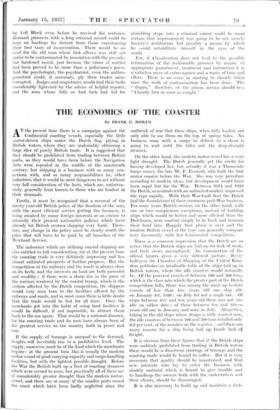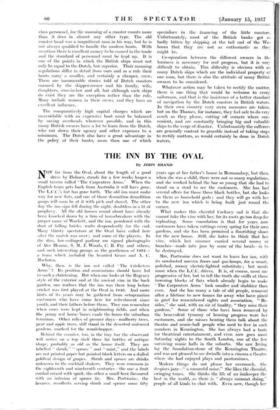THE ECONOMICS OF THE COASTER
By FRANK C. BOWEN AT the present time there is a campaign against the Continental coasting vessels, especially the little motor-driven ships under the Dutch flag, plying in British waters, where they are undeniably obtaining a large slice of purely British trade. It is suggested that they should be prohibited from trading between British ports, as they would have been before the Navigation Acts were repealed in the middle of the nineteenth century, but shipping is a business with so many con- nexions with, and so many responsibilities to, other induStries, that it would be most dangerous to act without very full consideration of the facts, which are, unfortun- ately, generally least known to those who are loudest in their deniands.
Firstly, it must be recognised that a reversal of the ninety-year-old British policy of the freedom of the seas, with the most efficient service getting the business, is being awaited by many foreign interests as an excuse to intensify their present nationalist policies which have already hit British oversea shipping very hard. There- fore, any change in the policy must be clearly worth the price that will have to be paid by all branches of the Merchant Service.
The industries which are utilising coastal shipping are also-entitled ta full consideration, for at the present time the coasting trade is very definitely improving and has almost unlimited prospects of further progress. But the competition of the railways and the roads is always close on. its heels,• and the interests on land are both powerful and wealthy ; if there were a sharp rise in the price of the services, rendered by the coastal tramp, which is the section .affected by the Dutch competition, the shippers would very soon turn to the facilities offered by the railways and roads, and in most cases there is little doubt that the trade would be lost for all time. Once the merchants got into the habit of using land facilities it would be difficult, if not impossible, to attract them back to the sea again. That would be a national disaster, for the coasting trade and its men have always been of the greatest service to the country both in peace and war.
If the supply of tonnage is unequal to the demand, freights will inevitably rise to a prohibitive level. The supply, moreover, must be of the kind which the merchants require : at the present time this is usually the modern motor-vessel of good carrying-capacity and cargo-handling facilities, but with the lightest possible draught. Before the War the Britiih built up a' fleet of coasting steamers which were second to none, but practically all of these are of considerably greater draught than the modern motor- vessel, and there are so many of the smaller ports round the coast which 'have been badly neglected since the outbreak of war that these ships, when fully loaded, are only able to use them on the top of spring tides. No business man with a cargo to deliver to a client is going to wait until the tides suit the deep-draught steamer.
On the other hand, the modern motor-vessel has a very light draught. The Dutch generally get the credit for having developed her, but actually it was a Thameside barge owner, the late Mr. F. Everard, who built the first motor coaster before the War. She was very primitive according to modern ideas, but development would have been rapid but for the War. Between 1914 and 1919 the Dutch, as neutrals with an unlimited market, improved the type rapidly. With their War-built fleet the Dutch laid the foundations of their enormous post-War business. For some years British owners, on the other hand, with one or two conspicuous exceptions, instead of building ships which would be better and more efficient than the Dutchmen, were content simply to lie back and bemoan their hard fate. Happily that phase is over and the modern British vessel of the type can generally compare very favourably with her Continental competitors.
There is a common impression that the Dutch arc so active that the British ships arc laid up for lack of work, and their crews unemployed. An examination of the official figures gives a very different picture. Every half-year the Chamber of Shipping of the United King- dom publishes an invaluable table of the ships laid up in British waters, where the idle coasters would naturally be. Of the powered vessels of between 100 and 500 tons, which is the class into which the greater part of the Dutch competition falls, there was among the most up-to-date vessels of less than five years old one ship idle on January 1st, 1936 ; on July 1st not a single one. Of ships between five and ten years old there was not one idle on either -date ; of those between ten and fifteen years old one in January and none in July. Altogether, taking in the old ships whose design is little wanted now, the idle coasters of between 100 and 500 tons totalled only 0.2 per cent. of the number on the register,—and there are many reasons for a ship being laid up beside lack of freight.
It is obvious from these figures that if the Dutch ships were suddenly prohibited from trading in British waters there would be a disastrous shortage of tonnage and the coasting trade would be bound to suffer. But it is very necessary that quality should be maintained, and that new interests who try to enter the business with shoddy material which is bound to give trouble and to handicap the owners both with the underwriters and their clients, should be discouraged.
It is 'also necessary to build up and maintain a first- class personnel; for the manning of.a coaster counts more than it does in almost any other type. The old coaster hand was a magnificent man in his way, but he is not always qualified to handle the modern boats. With overtime there is excellent money to be earned in the trade and the standard of personnel must be kept up. It is one of the points in which the British ships must not . only be equal to the Dutch, but superior. Their manning regulations differ in detail from ours and as a rule their boats. carry a smaller, and certainly a cheaper, crew. There arc innumerable stories told of Dutch coasters manned by the skipper-owner and his family, wife, daughters, sons-in-law and all, but although such ships do exist they are the exception rather than the rule. Many include women in their crews, and they have an excellent influence.
The comparatively high capital charges which are unavoidable with an expensive boat must be balanced by saving overheads wherever possible, and in this many British owners have a lot to learn from the Dutch, who cut down their agency and other expenses to a minimum. The Dutch also have a great advantage in the policy of their banks, more than one of which specialises in . the financing of the little coasters. Unfortunately,- most of the. British banks • got so badly bitten by shipping at the tail end of the War boom that they are not as enthusiastic as . they might be. .
Co-operation- between the different owners. in the business is necessary for real progress, but it is very difficult to obtain. This .difficulty, is obvious with . so .many Dutch ships which are the individual property of one .man, but- there is also the attitude of many British owners to be considered.
Whatever action may be taken to rectify the matter, there is one thing that would be welcome to every sailorman, and that is the insistence of a better standard of navigation by the Dutch coasters in British waters. In their own country very stern measures arc taken, but on the Thames, for instance, they feel safe to do very much as they please, cutting off corners where con- venient, and are constantly bringing big and valuable ships to the verge of disaster. Unfortunately the sufferers -are generally content to grumble instead of taking steps to rectify matters, as would certainly be done in Dutch waters.











































 Previous page
Previous page